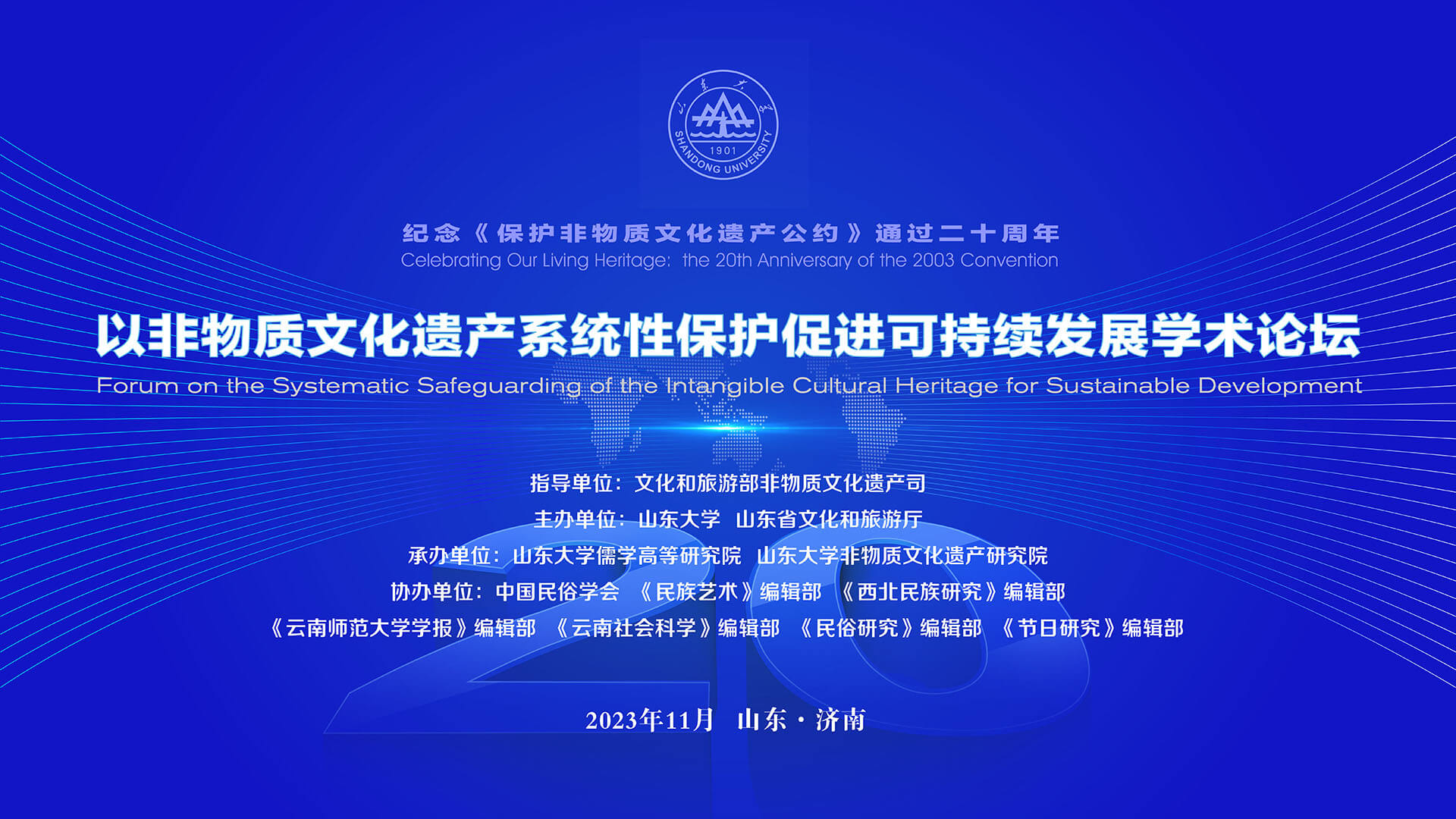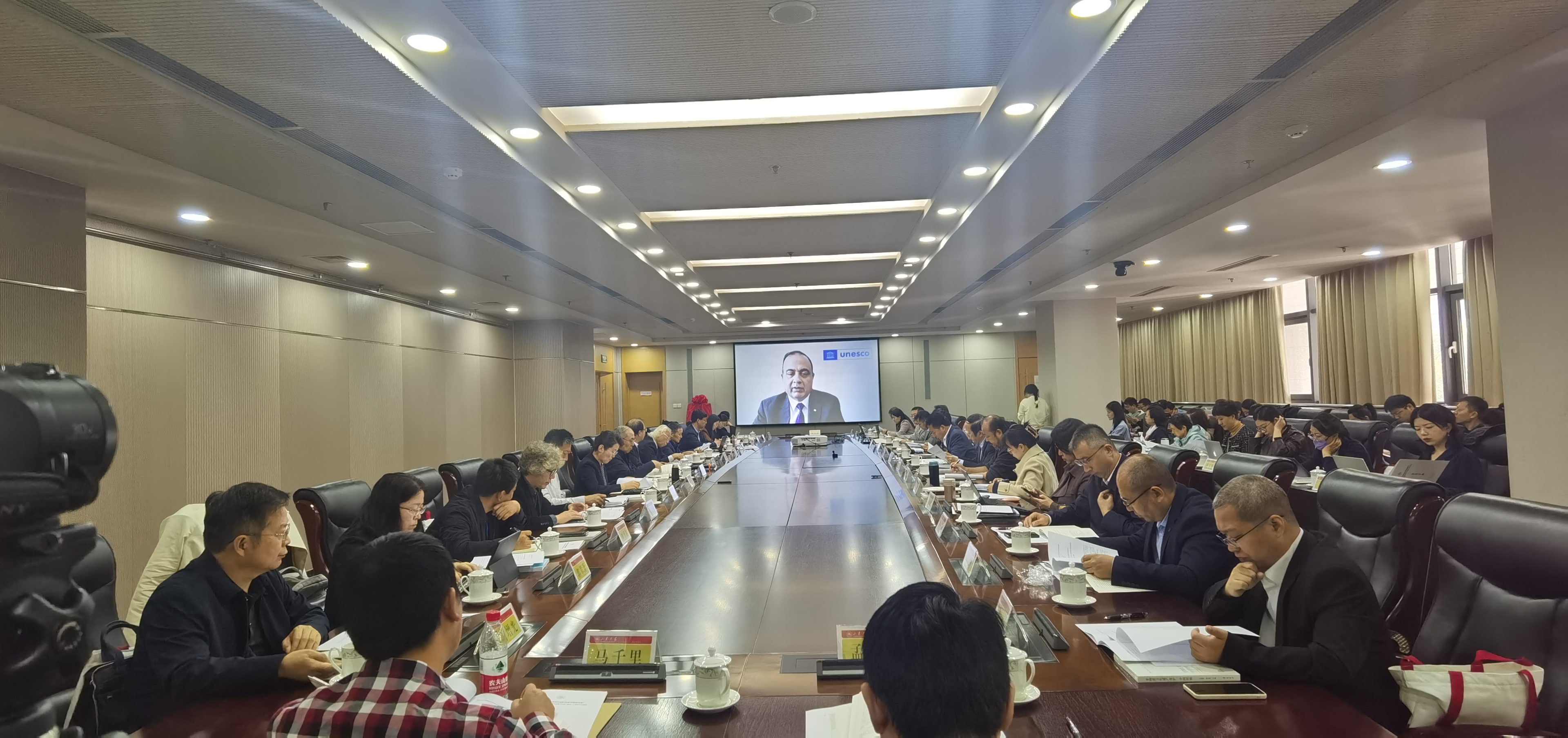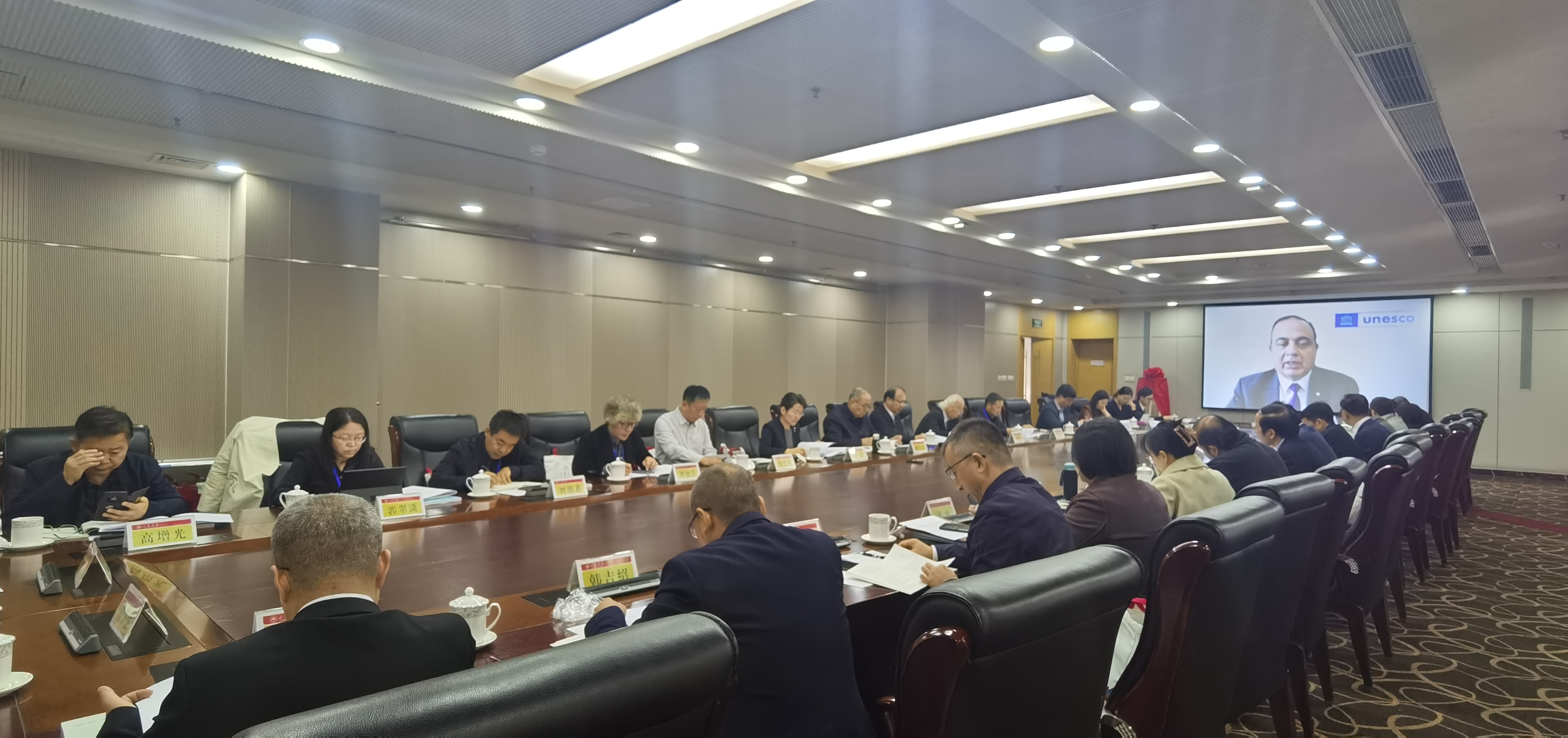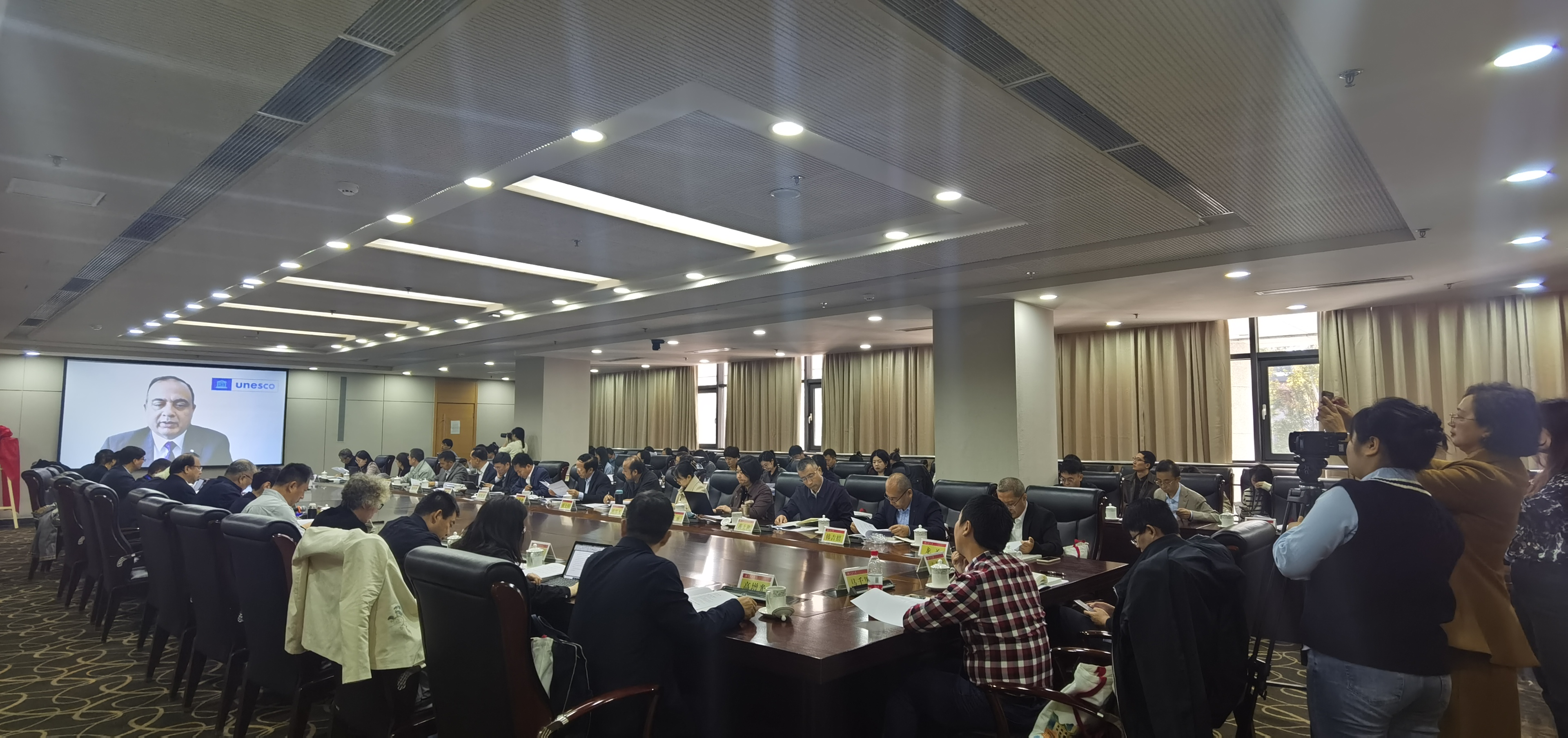|

Systematic Safeguarding of Intangible Cultural Heritage for Sustainable Development
4 November 2023
Opening Remark
(Pre-recorded video)
Prof. Shahbaz Khan
Director and Representative
UNESCO Multisectoral Regional Office to the Democratic People’s Republic of Korea, Japan,
Mongolia, the People’s Republic of China, and the Republic of Korea
Distinguished guests,
Ladies and gentlemen,
Good morning! On behalf of UNESCO, I am pleased and honoured for being invited to deliver the opening remark at the academic forum on Systematic Safeguarding of Intangible Cultural Heritage for Sustainable Development. I would like to thank the Department of Intangible Cultural Heritage of Ministry of Culture and Tourism for guiding the forum, Shandong University and Shandong Provincial Department of Culture and Tourism for organizing the forum; Institute of Folklore Institute of Advanced Confucianism of Shandong University, Institute of Intangible Cultural Heritage, China Folklore Society and all those involved for co-organizing this meaningful forum.
Twenty years ago, the Convention for the Safeguarding of the Intangible Cultural Heritage was adopted. The 20th anniversary this year provides the 181 State Parties of the Convention and all stakeholders involved in the safeguarding of living heritage with opportunities to highlight that living heritage belongs to all. Organised under the theme We Are #LivingHeritage, the anniversary is also the occasion to reflect on the role of the 2003 Convention in raising awareness about the diversity and richness of intangible cultural heritage and in fostering international cooperation.
The topic for the forum today is promoting sustainable development through systematic safeguarding of intangible cultural heritage. In my view, there are many measures that can be taken in order to achieve this goal, but I would like to highlight two key points.
First and foremost, there is a need to integrate ICH safeguarding in comprehensive policies, not only in the field of culture, but also in other areas of sustainable development such as agriculture, health, economic development or climate change. The close relationship between ICH safeguarding and sustainable development has been clearly indicated in the Convention since its outset. Throughout the years, the role of culture – including tangible and intangible, movable and immovable, underwater and on land, as well as a multitude of artistic and creative expressions – in building a more sustainable world has become more and more widely recognized and reflected in the international agenda. UNESCO’s advocacy efforts for the culture and development approach over the last decade resulted in the integration of culture in the 2030 Agenda for Sustainable Development adopted in 2015, in several UN Resolutions on Culture and Development adopted by the UN General Assembly, in other milestone international frameworks such as the New Urban Agenda. The Declaration adopted by the Ministers of Culture of UNESCO’s Member States at the UNESCO World Conference on Cultural Policies and Sustainable Development – MONDIACULT 2022, once again reaffirmed the commitment of the international community in the face of the urgent and complex contemporary challenges in our multicultural societies, to fully harness the transformative impact of culture for the sustainable development.
Secondly, the systematic safeguarding of ICH can only be achieved through a meaningful collaboration of a diverse range of stakeholders – government partners, communities, centers of expertise, research institutes, and civil society. I believe that the Convention has only been able to achieve the success that it enjoys today thanks to this collaboration. We can also witness this collaboration through concrete actions, such as the organization of this forum. Within this context, I would especially like to highlight the importance of civil society organizations, such as the China Folklore Society, one of China’s two accredited NGOs under the framework of the 2003 Convention. They are a pillar for the safeguarding of the world’s living traditions, together with the communities, government actors, academia and private sector. Civil society organizations do not only play a big role in domestic affairs, they also have great influence in global debates and in setting out direction of the convention. We wish to see stronger involvement of China’s NGOs in the mechanism and processes of the 2003 Convention and look forward to witness the concrete outcomes that they make on the ground.
Once again, I congratulate Shandong University, Shandong Provincial Department of Culture and Tourism and all the other co-organizers for their efforts in organizing the meaningful academic forum. I look forward to learning more about the “Chinese experience,” “Chinese solutions” and “Chinese wisdom” in safeguarding ICH, and to showcase them internationally.
Thank you and I wish you all a very fruitful day of dialogue and exchange.
以非物质文化遗产系统性保护促进可持续发展
2023年11月4日
开幕式致辞
(视频录制)

联合国教科文组织东亚多部门地区办事处驻华代表处主任
兼驻朝鲜民主主义人民共和国、日本国、蒙古国、中华人民共和国和大韩民国五国代表
夏泽翰(Shahbaz Khan)教授
尊敬的各位来宾,
女士们、先生们:
早上好!我谨代表联合国教科文组织应邀在“以非物质文化遗产系统性保护促进可持续发展”学术论坛上致开幕词,很高兴亦深感荣幸。感谢文化和旅游部非物质文化遗产司指导该论坛,感谢山东大学和山东省文化和旅游厅主办该论坛,感谢山东大学儒学高等研究院民俗学研究所、山东大学非物质文化遗产研究院、中国民俗学会以及所有相关人士共同参与到这次重要的论坛中来。
二十年前,《保护非物质文化遗产公约》获得通过。今年的二十周年纪念为该公约的181个缔约国和所有参与保护活态遗产的利益相关方提供了一个契机,以强调活态遗产属于每一个人。周年纪念活动的主题是“我们即#活态遗产”(We Are #LivingHeritage),同时也为反思《非遗公约》在提高人们对非物质文化遗产及其多样性和丰富性的认识以及促进国际合作方面所发挥的作用提供了一个契机。
今天论坛的主题是“以非物质文化遗产的系统性保护促进可持续发展”。我认为,为实现这一目标,可以采取许多措施,但我想强调两个关键点。
首先也是最重要的,有必要将非物质文化遗产保护纳入各项综合性政策,不仅关乎文化领域的政策,还包括农业、卫生、经济发展或气候变化等其他可持续发展领域的诸政策。《非遗公约》从一开始就明确指出了非物质文化遗产保护与可持续发展之间的密切关联。多年来,文化——包括物质的和非物质的、可移动的和不可移动的、水下的和陆上的,以及大量艺术的和创造性的表现形式——在建设一个更加可持续的世界方面所具有的作用得到了越来越广泛的承认,并反映在国际议程中。在过去的十年中,教科文组织致力于倡导并促进文化与发展的途径,其中既包括将文化纳入联合国大会于2015年通过的《2030年可持续发展议程》,也包括有关文化与发展的若干联大决议以及《新城市议程》等其他具有里程碑意义的国际框架。教科文组织会员国的文化部长们在“联合国教科文组织世界文化政策与可持续发展大会”(MONDIACULT 2022)期间通过的《宣言》中再次重申了国际社会的承诺,即应对各多元文化社会所面临的紧迫而复杂的当代挑战,应当充分利用文化的变革性影响以促进可持续发展。
其次,只有通过政府合作伙伴、社区、专业中心、研究机构和民间社会等各利益相关方的有效合作,才能实现非物质文化遗产的系统性保护。我相信,《非遗公约》能够取得今天的成就,离不开这样的合作。我们还可以通过具体的行动来见证此类合作,比如组织本次论坛。在这一背景下,我要特别强调民间社会组织的重要性,例如中国民俗学会,该学会是中国在《非遗公约》框架内获得认证的两个社团组织之一。这些社团组织与各社区、政府行为者、学术界和私营部门一道,已成为保护世界范围内活态传统的一个支柱。民间社会组织不仅在国内事务中发挥着重要作用,而且在全球辩论和确定该公约的方向上也有很强的影响力。我们希望看到中国的社团组织更多地参与到《非遗公约》的机制和进程中来,并期待着见证这类组织在实地取得的具体成果。
我再次祝贺山东大学、山东省文化和旅游厅以及所有其他承办和协办单位为组织这次富有意义的学术论坛所付出的努力。我期待着更多地了解非物质文化遗产保护的“中国经验”“中国方案”和“中国智慧”,并向国际展示。
谢谢大家,祝各位在今天的对话和交流中取得丰硕成果。



-->
文章来源:联合国教科文组织东亚多部门地区办事处驻华代表处
【本文责编:思玮】
|






